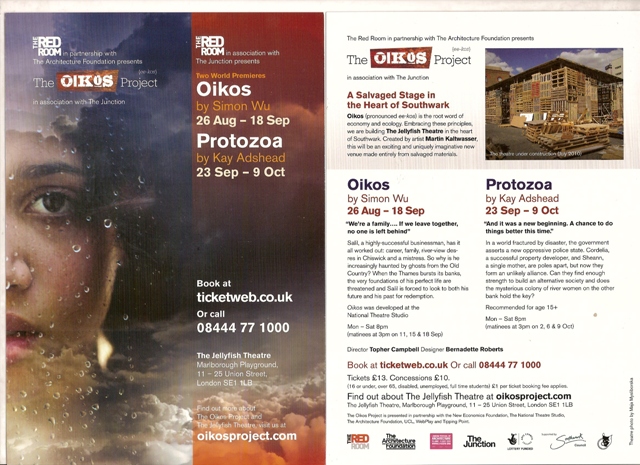| The OIKOS Project |

|

|

|
| Culture | |
| Wednesday, 15 September 2010 | |
|
The Oikos project
26-18 September, 2010
The Jellyfish Theatre,
11-12 Union Street,
London SE1 1LB
The Oikos Project is a courageous public event that deserves much more attention. Sited in Marlborough Playground on Union Street – an open space where Southwark has been keeping it out of developers’ reach for years – the project involves a temporary ‘salvaged stage’ and two theatre productions. The stage is called Jellyfish Theatre.
The Red Room and Architecture Foundation collaborate to make this project happen. Although it is part of the London Festival of Architecture, the birth of Jellyfish Theatre is a spectacle itself. Designed by architects/artists Kobberling Kalwasser from Berlin, the building is made entirely out of recycled materials, and every measure has taken to ensure its energy efficiency. The outcome is a labour-intensive, handmade structure that involves over 100 volunteers, 4,200 volunteer hours, 800 pallets, 3,000 nails, 750sqm of sheet material, 4-5 tons of timber, constructed over a 11- week period.
The theatre opens with Simon Wu’s new play Oikos, to be followed by Kay Adshead’s Protozoa.
Both plays are commissioned under one theme: climate change. In response to the theme, Wu has taken an implicit approach. The play sets to reflect our current state of being through the lives of three characters, revealing their respective inner worlds and priorities in life. The narrative has multiple layers and symbolisms, and prompts the audience to re-evaluate their priorities. The idea of home is expanded to suggest a larger system – our environment, our planet. By layering meanings, the message of the play unfolds as River Thames overflows.
Sitting inside the Jellyfish Theatre, one cannot help but to scrutinise the textured timber surfaces patched together with found materials. Video footages of exterior world depicting events that take place outside the house are projected onto these surfaces. Although at times it is also confusing that some outdoor activities are performed inside the house. According to Wu, the creative team has direct involvement in the design of the theatre space. The outcome, however, is more conventional than the original ideas due to various constraints.
This is not a production that can be seen without understanding its context – the endeavour to manually build a sustainable theatre space. The production has taken on the character of the building in terms of its apocalyptical atmosphere. The realisation of the space and the performance is an attempt to manifest the power of individuals unified by a shared vision. It does not provide answers to the future, but it asks questions: what kind of future do we want? Do we understand ourselves enough to plan for the next generations? How do we find common grounds? What is sustainable? And so forth.
I hope the dismantling of the Jellyfish Theatre will be as spectacular as its creation. And that it inspires artists and theatre practitioners to address the climate change issue in a comparably exciting and meaningful way.
Ingrid Hu
OIKOS by Simon Wu closes on 18 September.
PROTOZOA by Kate Adshead opens on 23 September.
Book at www.ticketweb.co.uk or call 08444 77 1000
|
|








